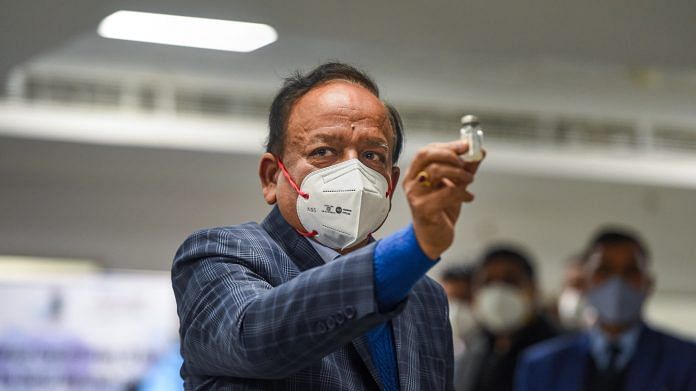New Delhi: Three studies looking at real-world evidence from the United Kingdom informed the Narendra Modi government’s decision to increase the Covishield second dose gap to 12-16 weeks from the earlier 6-8 weeks, ThePrint has learnt.
While the decision came on a day last week when the UK abridged the gap citing a SARS-CoV2 variant of Indian origin, none of the three studies actually looked at the results of a 16-week dose gap.
“A BMJ article from April 2021 makes an estimate of the first dose efficacy of vaccines and says that transmission is reduced by 50% after the first dose. That and two other articles informed our recommendation to increase Covishield dose gap to 12-16 weeks — one is the Bristol study and one in Scotland that looked at single dose protection. There were several other publications that helped us reach that decision,” a member of the National Technical Advisory Group on Immunisation (NTAGI) told ThePrint, on condition of anonymity.
Asked about the basis for the 16-week gap when no data exists, he said: “It is in the interest of flexibility. What if there is an emergency in the family at 12 weeks and the person cannot turn up for vaccinations. Even Canada has now started implementing a 16-week gap regimen.”
Last week, Spain too announced that it would now administer the AstraZeneca vaccine with a 16-week gap between the two doses.
India has maintained that the decision to increase the dose gap is a “scientific one” and does not have anything to do with vaccine shortages.
Also read: How long can you wait to take 2nd Covishield dose? What experts say & the science behind it
Lancet study looked at the entire population in Scotland
The Scotland study that the NTAGI member referred to was published in The Lancet. It looked at hospital records of 5.4 million people in Scotland and concluded that a single dose of Covishield gives an 88 per cent protection against hospitalisation.
The researchers wrote: “…the vaccine effect of a single dose is of policy interest when considering the ongoing debate over whether to defer a second dose to allow more rapid population coverage.”
The Government of India has so far maintained that the decision to increase the dose gap does not have anything to do with the current shortage of vaccines in the country.
The Bristol study, which is more commonly known as AvonCAP, has been conducted by the University Hospitals Bristol and Weston. AvonCAP, an ongoing surveillance project funded by Pfizer Inc., records detailed information on every adult patient admitted to Bristol’s two large NHS hospitals with symptoms, signs and/or X-ray evidence of acute disease in the lungs.
The study found: “One dose of the Oxford-AstraZeneca vaccine, which began to be used on 4 January 2021, was shown to be 80.4 per cent effective from 14 days after one dose at preventing symptomatic illness severe enough to result in hospitalisation. The patients studied had a median age of 88 years.”
The BMJ article, meanwhile, quotes data from Public Health England to make an assessment that adults infected with Covid-19 three weeks after receiving one dose of the Pfizer-BioNTech or Oxford-AstraZeneca vaccine were 38-49 per cent less likely to pass the virus on to their household contacts than people who were unvaccinated.
Even the parent company, AstraZeneca, does not explicitly talk about a 16-week dose gap.
This is what it says about delayed second dose of the vaccine: “Results demonstrated vaccine efficacy of 76% (CI: 59% to 86%) after a first dose, with protection maintained to the second dose. With an inter-dose interval of 12 weeks or more, vaccine efficacy increased to 82% (CI: 63%, 92%).”
It adds: “The analysis also showed the potential for the vaccine to reduce asymptomatic transmission of the virus, based on weekly swabs obtained from volunteers in the UK trial. The data showed that PCR positive readings were reduced by 67% (CI: 49%, 78%) after a single dose, and 50% (CI: 38% to 59%) after the two dose regimen, supporting a substantial impact on transmission of the virus.”
Also read: 26 potential cases of bleeding, clotting reported post Covishield vaccination in India, govt says



